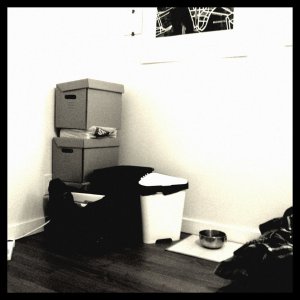i’ve just wrapped up the first semester of my mlis at sjsu (yes, that sjsu), and since i’ve outed myself for going to grad school i have been approached by colleagues and coworkers asking about my school choice, the how and the why of going to do my graduate degree. i reached out a lot last year while i was deciding on which path to take back to uni, and i thought i would post a brief hack library school of my own edition.
the facts: i have a library job, fully loaded with both resume-building challenges and the benefits of a permanent position. i wanted to keep this job while studying, so my options were all limited to part-time studies. my assets heading in included a bachelor’s degree with some research experience, generous academic references, and a strong professional network.
the options: i really only considered three universities: the university of alberta’s new online mlis (since 2013), the university of british columbia’s in-person mlis (part-time), and san jose state university’s all online mlis. there are other schools, and i have a couple of friends who have done the one-year accelerated at western, but moving was not for me so long as there were other options available.
the arguments.
my choice to study at san jose was part practicality and part gut feeling.
for practicality, ubc’s big con was the time it would take me to commute all the way out to point grey. these were hours that could instead be logged doing coursework (or not), and it factored into the overall cost of the program. i’ve done long commutes— they really suck.
u of a’s con was the limited scope of their online program: it could only be done over three years, and because it was just launching there would be few to no course choices. i’ve heard great things about faculty at u of a, and their hci dual-masters looks amazing, but it became obvious to me that their online program was going to be a whole different game. this might be a great choice in a few years, or for someone completely new to librarianship, but for me it was very limited offerings with a program still in its beta launch.
sjsu’s program offered a lot more flexibility of pace and variety of course offerings than u of a. it also came with a much higher price tag than ubc. ultimately, i did some speculative math and determined that while ubc’s tuition was lower (half the cost!), i would have to leave my permanent job for auxiliary work (no benefits, certainly fewer hours per week) and also pay the higher cost of commuting (fuel, maintenance, parking) making it probably a lot closer to even.
the gut feeling i had was that sjsu as an online-only program would give me a much higher quality of education than u of a. ubc also clarifies on their website that part-time students are heavily discouraged, so i wasn’t clear whether that would weigh against me. on this count i’m confident in my decision— i feel like sjsu’s content is pretty airtight for online students, and i never feel like a fringe audience (even as a canadian!).
the recommendations.
i absolutely feel that i made the best decision for me in pursuing my mlis with sjsu. i’ve been so privileged with the faculty i have connected with so far, i love that so many of my coursemates are also already working in libraries, the school is very communicative and organised, the available content is so vast that i’m having a hard time narrowing it to only 43 credits, and the online format is engaging and smart.
that all said, i don’t think it’s the best choice for everyone. an mlis is not a ticket into a sure fire career, and professional networks play a huge part. i would definitely recommend an in-person program close to home (or stay and make a new home) for folks just entering the field. for anyone able to take a sabbatical, the university of western ontario offers a 12 month accelerated program— but again, those who did well with this had a network or employer to come back to.
the concerns.
when i tell folks i am doing my degree online i still get people who think i’m mailing away for stamps circa 1987. i’ve had people worry that i was being scammed by a school that didn’t actually exist (fact: sjsu exists, and is mostly on-campus degrees). and i’ve had colleagues laugh and tell me that they “made fun of san jose” at their school.
i’ve been reading a lot of hiring librarians interviews, and i’ve read testimonials by hiring managers who say they would never hire a student with an online degree (i’ve also read plenty of successful alumni profiles from sjsu, so clearly someone is hiring). if the hiring librarians blog has taught me anything, it’s that there is definitely no pleasing most people. some won’t hire me because i studied virtually, or because i didn’t attend their alma matter, or because i have six years of experience as a technician (read: the untouchables of libraries). in short, people can be ignorant snobs sometimes and i’m not going to make my career decisions based on this kind of bs.
so, yes— i’m going to that sjsu. it’s awesome. thanks for asking.
and for those of you genuinely interested, i’m happy to chat anytime.


